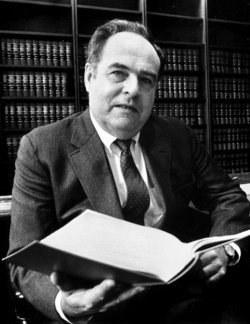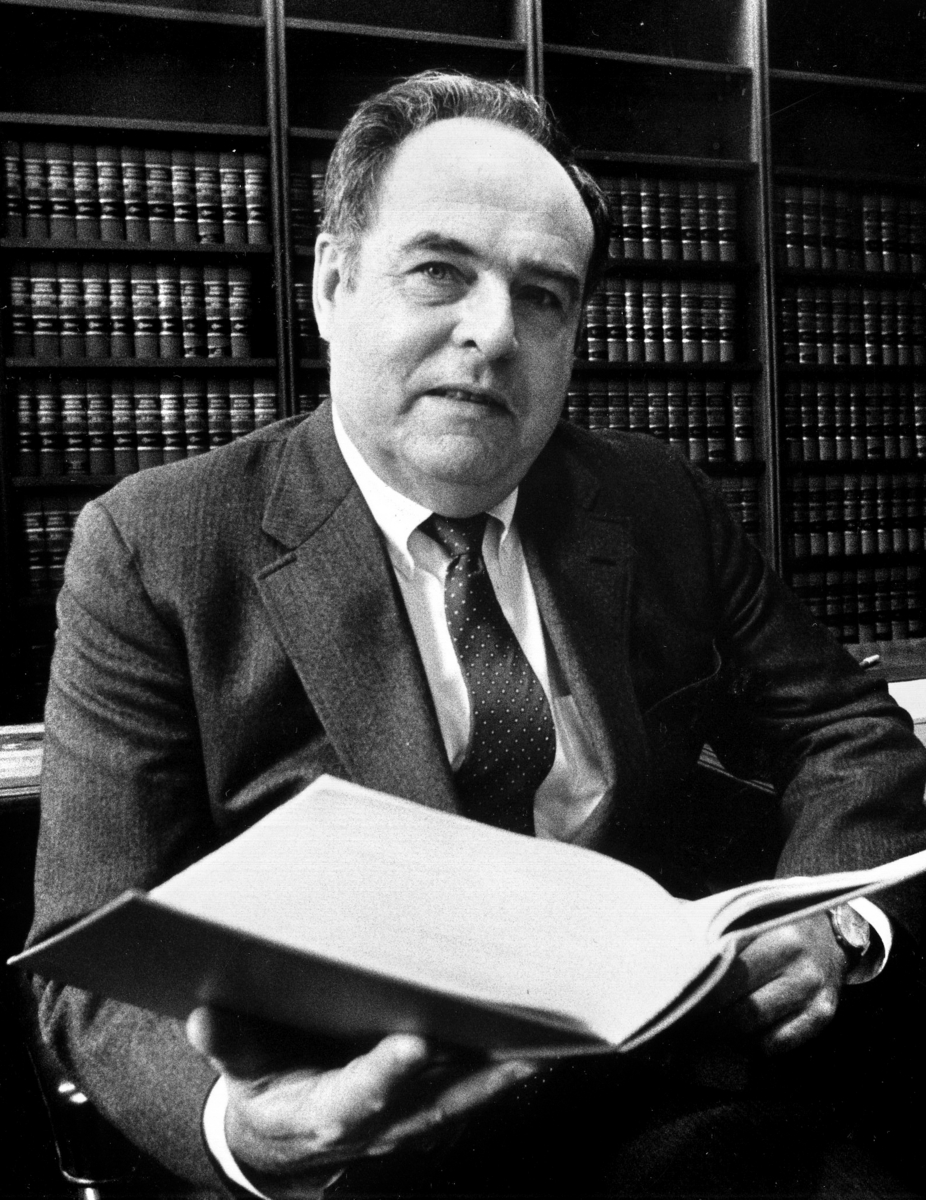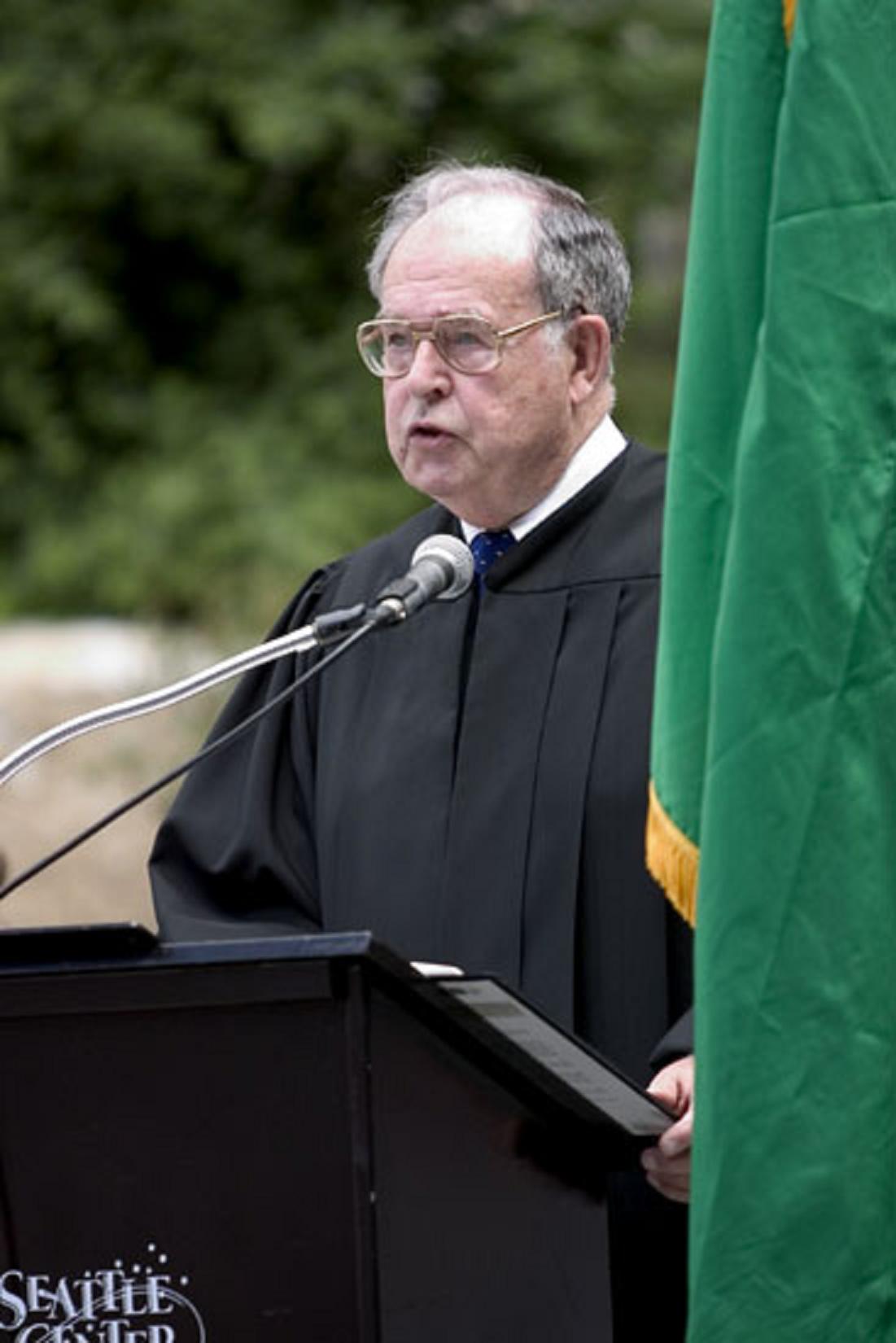A third-generation Seattleite, Judge Beezer was a "consummate gentleman" who abhorred incivility as much as he loved the law, said his friend and colleague of 25 years, 9th Circuit Judge Diarmuid O'Scannlain, of Portland.
"He was a very highly respected judge," said O'Scannlain, who described Judge Beezer as a thoughtful, diligent jurist. "He wouldn't try to twist the precedents we have to follow. He would take them as they are and apply them without fear or favor."
Judge Beezer, a longtime smoker who quit cigarettes about a dozen years ago, died Friday (March 30) at Swedish Medical Center in Seattle of lung cancer after a relatively short illness. He was 83.
Born July 21, 1928, Judge Beezer was the son of Arnold Beezer, a prominent Seattle attorney, and the grandson of Michael Beezer, one-half of the Beezer Brothers Architecture Firm that designed the 1908 incarnation of Colman Dock and several local Roman Catholic institutions, including O'Dea High School, beginning in the early 1900s.
A graduate of St. Joseph's School and Seattle Prep, Judge Beezer studied at the University of Washington for two years before transferring to the University of Virginia, where he earned his undergraduate degree in 1951. He joined the Marine Corps and worked as a supply officer in North Carolina during the Korean War, said his wife of 54 years, Hazlehurst Beezer. He served for 20 years in the Marine Corps Reserve, retiring with the rank of lieutenant colonel.
After two years in the Marine Corps, Judge Beezer earned his law degree from the University of Virginia in 1956.
Judge Beezer and his future wife — whom he met on a blind date in Washington, D.C. — married in 1957 and returned to Seattle, where he joined the law firm then known as McMicken, Rupp and Schweppe (it later became Schweppe, Krug, Tausend, Doolittle & Beezer, a law firm that, at 110 years old, was one of the oldest in the state when it closed in 1989).
Judge Richard Tallman, also with the 9th Circuit, said Judge Beezer took him under his wing, first as a young attorney in the mid-1980s and later as a colleague when Tallman joined the court in 2000.
Tallman estimated that Judge Beezer participated in some 10,000 cases over his judicial career and still carried a case load of 200 to 300 cases a year even after moving from "active status" to "senior status" in 1996.
Though he could have retired and still been paid for his life appointment, Judge Beezer continued working, even utilizing computer technology that read aloud legal briefs and enlarged text on an oversized monitor so he could keep up with the vast amounts of reading despite failing eyesight.
"He was very bright. Nobody knew the law better than Bob Beezer. … If you appeared before him, you better know the law, and you better know the facts of your case cold," Tallman said. "He set a very high bar for the practice of law, as a lawyer and a judge. He worked very hard at doing his best, and he expected that of everyone who appeared before him."
An excellent writer, Judge Beezer quietly delighted in the fact that he had "one of the highest rates of affirmations" from the U.S. Supreme Court on cases appealed from the 9th Circuit, which covers nine Western states and two territories and handles approximately 16,000 cases a year, Tallman said.
Last year, an opinion Judge Beezer wrote in what is known as the "Anna Nicole Smith case" — a legal battle between the late Playboy model and the heirs of her oil-baron husband over his estate after his death in 1995 — was upheld by the U.S. Supreme Court. That opinion narrowed the definition of a "core proceeding" and is considered one of the most significant rulings on Article III of the U.S. Constitution and the scope of congressional authority to delegate judicial power, according to a news release issued by the 9th Circuit Court.
Judge Beezer also wrote the opinion in A & M Records Inc. vs. Napster, a 2001 decision that held that Napster and other file-sharing services could be held liable for contributory or vicarious infringement — an opinion that was among the first to address whether file sharing constituted fair use and set the tone of the law that followed, according to a news release issued by the 9th Circuit Court.
In 1991, Judge Beezer was also the first to announce the "reasonable woman" standard for sexual-harassment cases, it says. One news report from the time explained it as "what a reasonable woman would consider an abusive or hostile work environment."
"He was a wonderful man," who "was at the breakfast table every morning, and at the dinner table every night," Hazlehurst Beezer said of her husband. He kept working so long because "life would've been less interesting without it."
In addition to his wife, Judge Beezer is survived by a sister, Allison Tyree, of Australia; a brother, Arnold Roswell Beezer, of Post Falls, Idaho; sons Robert Dorsey Beezer, of Gig Harbor, and John Leighton Beezer, of Seattle; daughter Allison Beezer, of Seattle; and two grandsons
A third-generation Seattleite, Judge Beezer was a "consummate gentleman" who abhorred incivility as much as he loved the law, said his friend and colleague of 25 years, 9th Circuit Judge Diarmuid O'Scannlain, of Portland.
"He was a very highly respected judge," said O'Scannlain, who described Judge Beezer as a thoughtful, diligent jurist. "He wouldn't try to twist the precedents we have to follow. He would take them as they are and apply them without fear or favor."
Judge Beezer, a longtime smoker who quit cigarettes about a dozen years ago, died Friday (March 30) at Swedish Medical Center in Seattle of lung cancer after a relatively short illness. He was 83.
Born July 21, 1928, Judge Beezer was the son of Arnold Beezer, a prominent Seattle attorney, and the grandson of Michael Beezer, one-half of the Beezer Brothers Architecture Firm that designed the 1908 incarnation of Colman Dock and several local Roman Catholic institutions, including O'Dea High School, beginning in the early 1900s.
A graduate of St. Joseph's School and Seattle Prep, Judge Beezer studied at the University of Washington for two years before transferring to the University of Virginia, where he earned his undergraduate degree in 1951. He joined the Marine Corps and worked as a supply officer in North Carolina during the Korean War, said his wife of 54 years, Hazlehurst Beezer. He served for 20 years in the Marine Corps Reserve, retiring with the rank of lieutenant colonel.
After two years in the Marine Corps, Judge Beezer earned his law degree from the University of Virginia in 1956.
Judge Beezer and his future wife — whom he met on a blind date in Washington, D.C. — married in 1957 and returned to Seattle, where he joined the law firm then known as McMicken, Rupp and Schweppe (it later became Schweppe, Krug, Tausend, Doolittle & Beezer, a law firm that, at 110 years old, was one of the oldest in the state when it closed in 1989).
Judge Richard Tallman, also with the 9th Circuit, said Judge Beezer took him under his wing, first as a young attorney in the mid-1980s and later as a colleague when Tallman joined the court in 2000.
Tallman estimated that Judge Beezer participated in some 10,000 cases over his judicial career and still carried a case load of 200 to 300 cases a year even after moving from "active status" to "senior status" in 1996.
Though he could have retired and still been paid for his life appointment, Judge Beezer continued working, even utilizing computer technology that read aloud legal briefs and enlarged text on an oversized monitor so he could keep up with the vast amounts of reading despite failing eyesight.
"He was very bright. Nobody knew the law better than Bob Beezer. … If you appeared before him, you better know the law, and you better know the facts of your case cold," Tallman said. "He set a very high bar for the practice of law, as a lawyer and a judge. He worked very hard at doing his best, and he expected that of everyone who appeared before him."
An excellent writer, Judge Beezer quietly delighted in the fact that he had "one of the highest rates of affirmations" from the U.S. Supreme Court on cases appealed from the 9th Circuit, which covers nine Western states and two territories and handles approximately 16,000 cases a year, Tallman said.
Last year, an opinion Judge Beezer wrote in what is known as the "Anna Nicole Smith case" — a legal battle between the late Playboy model and the heirs of her oil-baron husband over his estate after his death in 1995 — was upheld by the U.S. Supreme Court. That opinion narrowed the definition of a "core proceeding" and is considered one of the most significant rulings on Article III of the U.S. Constitution and the scope of congressional authority to delegate judicial power, according to a news release issued by the 9th Circuit Court.
Judge Beezer also wrote the opinion in A & M Records Inc. vs. Napster, a 2001 decision that held that Napster and other file-sharing services could be held liable for contributory or vicarious infringement — an opinion that was among the first to address whether file sharing constituted fair use and set the tone of the law that followed, according to a news release issued by the 9th Circuit Court.
In 1991, Judge Beezer was also the first to announce the "reasonable woman" standard for sexual-harassment cases, it says. One news report from the time explained it as "what a reasonable woman would consider an abusive or hostile work environment."
"He was a wonderful man," who "was at the breakfast table every morning, and at the dinner table every night," Hazlehurst Beezer said of her husband. He kept working so long because "life would've been less interesting without it."
In addition to his wife, Judge Beezer is survived by a sister, Allison Tyree, of Australia; a brother, Arnold Roswell Beezer, of Post Falls, Idaho; sons Robert Dorsey Beezer, of Gig Harbor, and John Leighton Beezer, of Seattle; daughter Allison Beezer, of Seattle; and two grandsons
Inscription
LTCOL US MARINE CORPS KOREA, VIETNAM
Family Members
Sponsored by Ancestry
Advertisement
Explore more
Sponsored by Ancestry
Advertisement








